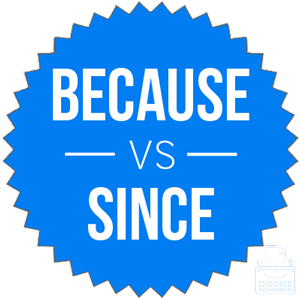When you need to show how two ideas are related, you will often use either because or since. These words are simple to use, and help get your point across clearly and concisely.
Because and since are conjunctions, which means they link things together both grammatically and logically. They are also easy to misuse or overuse, which is why it is important to know the differences between them and how to use each correctly.
What is the Difference Between Because and Since?
In this post, I will compare since vs. because. I will use each word in several example sentences because it is important to see how they function in context.
I will also use a mnemonic device that will help you when you need to choose either since or because.
When to Use Because
 What does because mean? Because is a conjunction. It typically expresses a logical link between two ideas or events. Often, this link is due to cause and effect.
What does because mean? Because is a conjunction. It typically expresses a logical link between two ideas or events. Often, this link is due to cause and effect.
For example,
- We aren’t allowed to have drinks in the computer lab anymore because too many people spilled coffee onto the keyboards.
- You are invited to my birthday party because I think you are a cool person and I want to hang out with you.
- Kushner faces potential trouble because he currently works in the White House and neglected to mention the encounter on forms he filled out for a background check to obtain a security clearance. –The New York Times
Contrary to common belief, it is perfectly all right to begin a sentence with because as long as it is a complete sentence and you construct it carefully. The fragment Because I am cold is not a complete sentence, but Because I am cold, I will wear a sweater would work just fine.
When to Use Since
 What does since mean? Since is also a conjunction that expresses a logical link between two ideas or events. In this way, it can sometimes be a synonym of because.
What does since mean? Since is also a conjunction that expresses a logical link between two ideas or events. In this way, it can sometimes be a synonym of because.
Since typically describes a weaker or indirect cause and effect link, like in the sentences here:
- We figured it would be OK to go to Donatello’s since we knew Brian wouldn’t be there.
- Many car parts are made of aluminum, since aluminum is lighter than steel.
Of course, since also refers to two things that are linked temporally, one of which happens after the other.
For example,
- The pundit’s ratings have dropped since she stopped interviewing guests live on set.
- Ashley has not been to the gym since March.
- The decision of Robart, who was nominated by President George W. Bush and has been on the bench since 2004, was the most consequential because of its national implications. –The Washington Post
It is not always clear whether since implies temporal or logical linkage, so writers need to use it carefully and construct sentences that minimize ambiguity.
Trick to Remember the Difference
 In the sense of logically connected ideas or events, because and since are synonyms.
In the sense of logically connected ideas or events, because and since are synonyms.
- Because typically implies a stronger causal link than since.
- Since is a better fit when things have a temporal relationship.
Because vs. Since Check: Since and sequential each begin with the letter S, so it should be easy to link since with events that happen in sequence.
Summary
Is it because or since? Because and since are conjunctions that describe a logical relationship between ideas or events. Since can also describe a sequential relationship between two events. Since can be ambiguous, so use it carefully.
Contents
